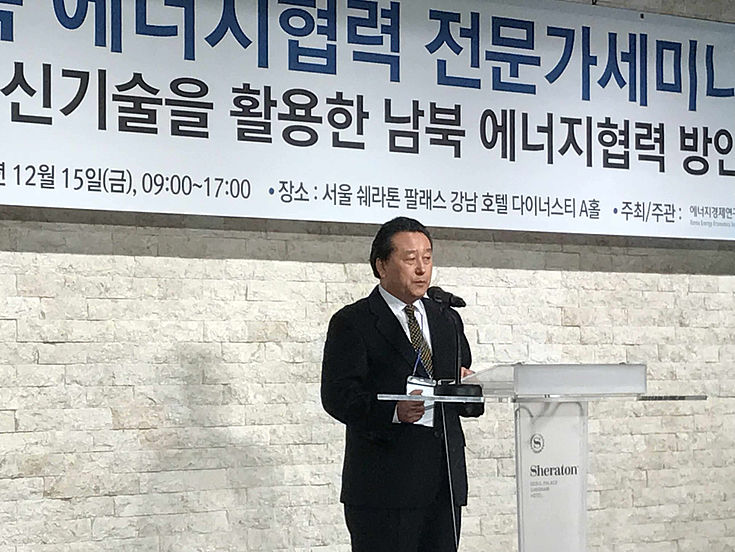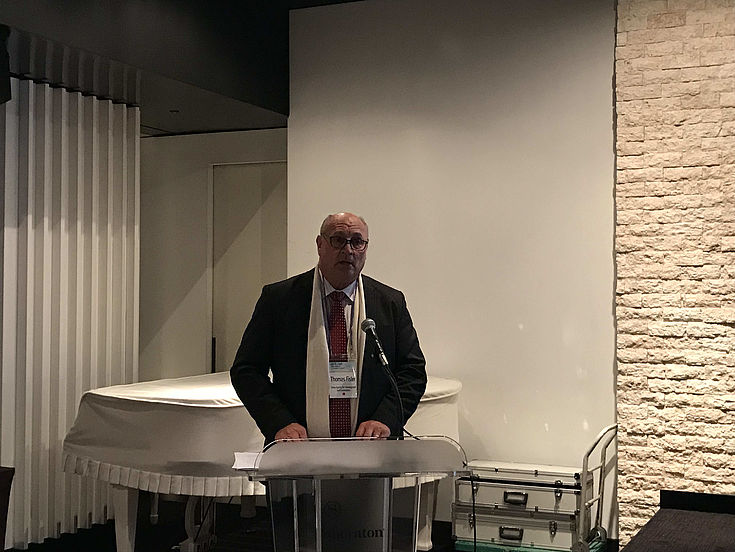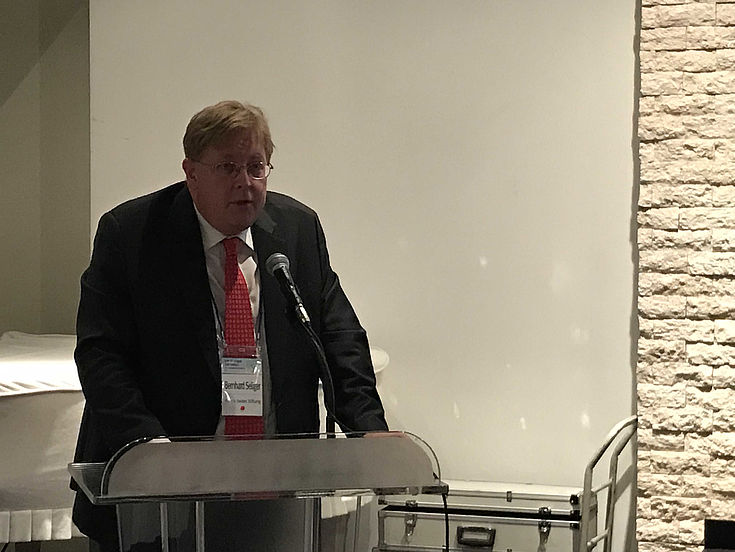Experts-Seminar
Energy Cooperation between South and North Korea
Joo-Heon Park, President of KEEI
The event also hosted a special guest - Thomas Fisler, former Director of the Pyongyang Bureau of the Swiss Agency for Development and Cooperation (SDC), who lived and worked in Pyongyang for the last 4 years.
The event started with the opening remarks by Joo-Heon Park (President of the KEEI), followed by congratulatory remarks from a delegate of the Ministry of Trade, Industry and Energy, in which both welcomed the speakers and participants, especially Thomas Fisler and Dr. Bernahard Seliger (Resident Representative of Hanns Seidel Foundation Korea).
"Humanitarian situation forgotten by the international community"
"Nearly 2 million children and mothers are in need of basic nutritional support, and almost 30 % of under-five year-olds are affected by stunting. The humanitarian situation is forgotten by the international community in many years", said Mr. Fisler in the beginning of his presentation about "Politics, Economy and Social Development in the DPRK". He also stressed out that over 350,000 pregnant women are constantly at severe risk of life-threatening situations due to poor health care services. Mr. Fisler also pointed out the uniqueness of North Korea where exceptional weather situations such as flood, drought, erosion and landslides further weaken the coping mechanisms and can quickly invoke into catastrophes as it has happened many times in the last couple of years.
Thomas Fisler, former SDC Director in Pyongyang
Mr Fisler then emphasized the political context: despite heavy sanctions North Korea will continue its pursuits of nuclear weapons and ballistic missiles. Moreover, two main policies are followed by the DPRK, namely the increase of living standards of the population and their isolation from the outside world. Both approaches would make control over the population easier. Mr Fisler also mentioned that the country is relatively stable and internal economic or political crises most probably is not going to happen, and thus popular uprising seems unlikely.
Divided into two worlds
The former SDC Director described the economic situation in North Korea as being divided into two opposite worlds in Pyongang and the North Korean countryside. Since in the latter case a higher level of self-sufficiency is prevailing, sanctions would have almost no impact there. And even rising oil prices, which doubled last year, hardly influenced other prices in North Korea. He also mentioned that "without the unofficial and steadily growing private market economy, the state economy would be dysfunctional".
Mr Fisler explained that hardly any social development can be observed in North Korea, especially outside Pyongyang, since "people's daily struggle with their life doesn't allow them to consider the social context - they simply obey the orders of the people's committees and the leadership". Thereby the loyalty of the people is undoubted, and no criticism or questioning can be noticed. However private market economy is advancing rapidly, and the government can not do anything about it but tolerate.
Dr. Bernhard Seliger, Resident Representative of HSF Korea
Countryside still pitch-dark
In the first part of his presentation, Dr Seliger described the current energy situation in the DPRK. Despite the international sanctions, energy supply has been increasing but is still not enough to cover the country, exemplified by (satellite) pictures showing that Pyongyang is brightly lighted up while the countryside is still pitch-dark for the very most part. They also indicate a high number of mostly small hydropower plants throughout whole North Korea. However, the reasons behind the energy increase are not completely clear yet. Coal seems to remain an important source of energy. The HSF Representative showed examples of old oil plants with East and West German technology built in the 1970s, which have not been used in years, but are being refurbished for future energy production.
Dr Seliger then carried on with the second part of his presentation pointing out some possibilities for energy cooperation. He saw the Green Climate Fund as an avenue for future cooperation, especially since HSF Korea had already approached a baseline for forestry projects with its proposed program on forest inventory preparation. Another opportunity would be North-South cooperation through 3rd parties, i.e. smaller scale pilot projects conducted by organizations already working with the North could be a first step and create a cooperation basis. But international sanctions, such as the current ones, would severely impair this kind of approaches. The last possible cooperation groundwork Dr Seliger mentioned is the inclusion of North Korea into the South Korean Emission Trading System (ETS) setting free South Korean funds and thus generating strong financial incentives in the North to enhance cooperation.
The first session ended with a plenary discussion and a follow-up question and answer session with the in-depth discussion between the panellists and the audience.



